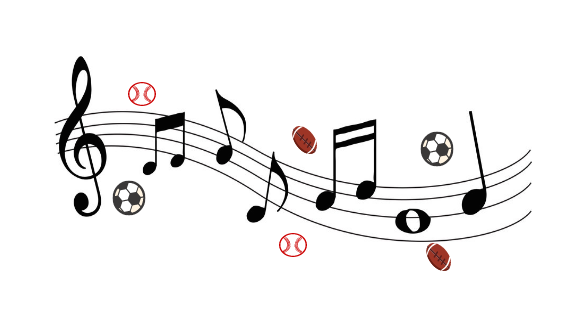Music, sports offer students equal challenges through play
August 15, 2016
The whistle blows. The ball is passed from person to person. They punt and pant and sprint. The referee keeps track of the time. The final goal makes it into the net. The crowd cheers.
The baton flicks. The melody is passed from person to person. They drum and hum and strum. The metronome keeps track of the time. The final chord is released into the air. The audience cheers.
Sports and music are quite similar to one another, despite being from two very different realms. Yet even with its parallelity at the high school level, music does not receive attention equal to that of its distant cousin. Music is just as competitive and worthy of praise as sports.
Many sports enthusiasts may claim that there is no physical exercise involved in music, and the health benefits are inferior to those of sports. It is a mistake to think this, as not only can it loosen your wrists, arms and oral cavity, but music is also highly beneficial for your mental health. Through playing music, people are able to express themselves and relieve stress.
“It [music] keeps me sane sometimes. String Orchestra is one of the only classes during the day when I can just relax,” senior Ha Neul On said, who is the concertmaster of the String Orchestra and a co-captain of the boys’ rugby team.
Also, a 1999 paper by Laurence O’Donnell III shows that listening to music lowers blood pressure, which minimizes the risk of heart disease or stroke. On top of that, through blowing through a reed or mouthpiece, musicians maintain healthy respiratory health, just like athletes do when exercising.
Likewise to sports, music enhances learning. Though you may not be thinking strategically about how to score the next goal, there are ways in which music benefits cognitive skills. Memorization and listening are a huge part of learning to sing or play an instrument.
Athletes may disagree and say that there is not as much tough work and thrill involved.
“I think sports is more adrenaline and music is more practice, and so when it gets to performances, it’s not the same thing,” freshman soccer player Tyler Potter said.
Potter’s assertion, however, is false, as music involves a profusion of frantic multitasking. You could be reading pitches and rhythms, listening to other players, and watching the conductor as you change notes on the fingerboard, shift to different positions, vibrate your fingers, switch the string you’re bowing, keep your bow in the right position, and use different parts of the bow to create different tones.
Even with so many actions taking place while playing music, athletes may suggest that playing music involves little competition and teamwork. Teamwork is in fact very important in music, as it is necessary to work together with many people to perform a piece.
“You have to listen to all the people you’re playing with, you have to breathe together, you just have to stay together,” On said.
By performing with many people, music creates a sense of unification between players, singers and listeners that is as powerful as in sports.
“It[music] is one of the universal languages that all humans speak,” On said. “Everybody listens to music. It’s more universal than sports.”
So next time you lend an ear to a music concert, respect the musicians just as you would athletes, as they put in the same amount of effort and teamwork to create masterpieces everyone can enjoy.










